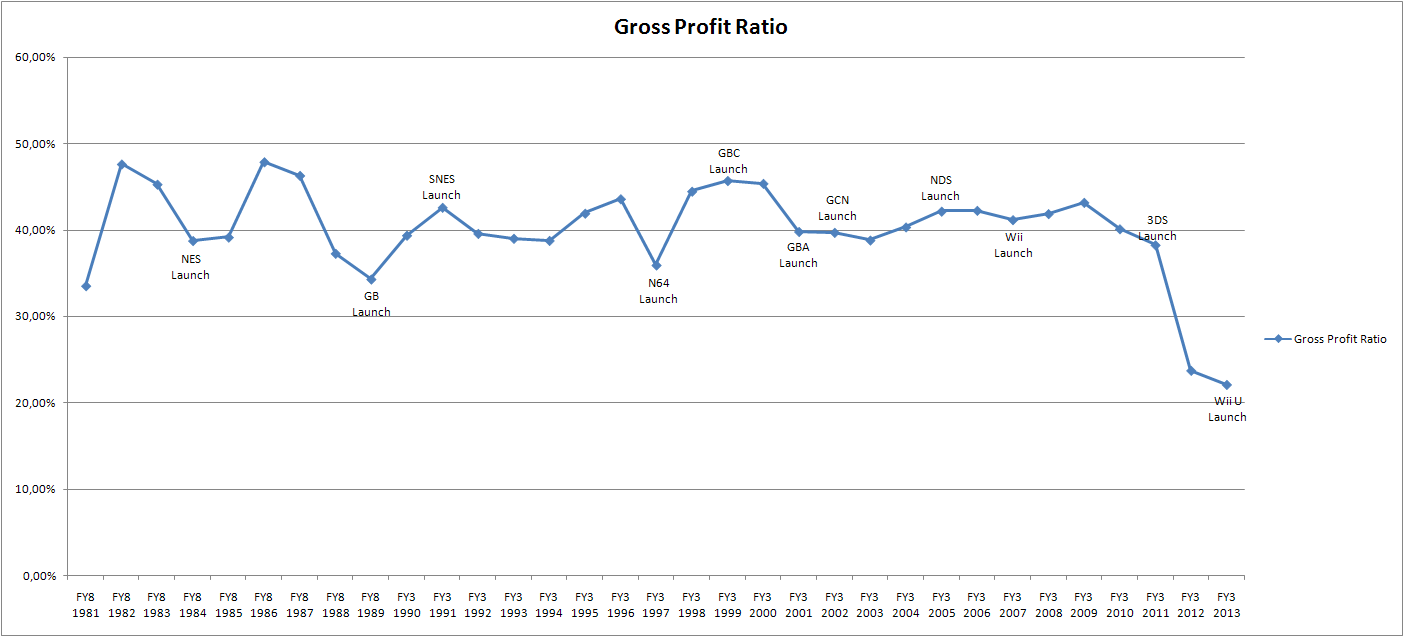lwilliams3
Member
Oh, there's certainly a very valid argument to be had about why Nintendo immediately rushing to smartphone development could backfire, and why it's a bad idea for their company culture.
Really, the largest blight at Nintendo right now is the Wii U. 3DS is underperforming in overseas retail (compared to the DS third-party wise) most definitely, but Wii U in particular is draining company profits. Unfortunately, Nintendo seems to have lost the knack for staying afloat despite a mediocre console.
The decent profitability we saw during the GameCube / GBA / early DS era can't seem to be sufficiently recouped by the 3DS, and Wii U losses are certainly more extravagant and systemic than the GameCube.
(Keep in mind, the 3DS underperforming / handheld market shrinking is a larger long-term problem)
But you're right. This fiscal year, Nintendo's marketing / research and development costs are 23 billion JPY larger than their initial 100 billion JPY operating income forecast accounted for. However, that doesn't excuse an overall operating loss, especially another 35 billion JPY loss.
Investors were willing to give Iwata allowances because of the expectations behind the Wii U. When the Wii U initially flopped, investors gave the console the benefit of the doubt out of goodwill. But now that we have a full year of underwhelming holiday performance and widely-reported worldwide failure?
I'm just worried that if Iwata underdelivers with nothing but half-baked, relatively minor changes to corporate strategy, many will lose faith in his abilities...and this could have repercussions.
Personally I hate the Wii U. Don't get me wrong, I love my console and I adore the 15+ games I've purchased for it, but I feel that in a business sense it's becoming more and more of a lost cause...a Virtual Boy-esque burden for the company because of its heavily flawed implementation that should be replaced by something more fundamentally promising...with a "third pillar," so to speak.
I don't think the Wii U should be supported software-wise after Zelda / Smash Bros. / Mario Kart / other scheduled, tentpole projects come out. I think Nintendo should prioritize its time and attention on what's next on the horizon.
Some issues may come up either way:
1) Since Nintendo likely has many Wii U projects in various development stages, will it be possible to create a new system that is BC with the Wii U to ensure easier transition (and to not completely burn fans that have brought a Wii U) without signicantly increasing the development costs?
2) If it is BC with the Wii U, will that compromise their goal on developing a next-gen system that has a unified architecture with it's next-gen portable?
It is unfortunate that I don't believe Nintendo was considering architecture unification with their systems when they came up with the specs of the Wii U since it not really in sync with common current portable technology. The hellish development of the system and the increase of workforce needed to make games for the Wii U and 3DS may be the reason why Nintendo decided to do this next time. BC with the Wii U may have be sacrificed to make integrated systems for the future.
A focus of BC for their next-gen systems will have issues either way since the CPU architecture for the Wii U has been stretched to near its feasible limit aside from adding more cores. If anymore tech-savvy people are able to contribute to that conclusion, I'm open to hear what they have to say.

